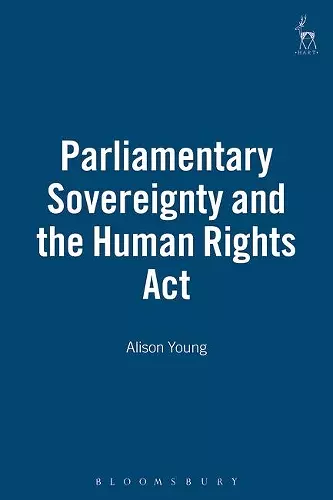Parliamentary Sovereignty and the Human Rights Act
Format:Hardback
Publisher:Bloomsbury Publishing PLC
Published:5th Dec '08
Currently unavailable, and unfortunately no date known when it will be back

The Human Rights Act 1998 is criticised for providing a weak protection of human rights. The principle of parliamentary legislative supremacy prevents entrenchment, meaning that courts cannot overturn legislation passed after the Act that contradicts Convention rights. This book investigates this assumption, arguing that the principle of parliamentary legislative supremacy is sufficiently flexible to enable a stronger protection of human rights, which can replicate the effect of entrenchment. Nevertheless, it is argued that the current protection should not be strengthened. If correctly interpreted, the Human Rights Act can facilitate democratic dialogue that enables courts to perform their proper correcting function to protect rights from abuse, whilst enabling the legislature to authoritatively determine contestable issues surrounding the extent to which human rights should be protected alongside other rights, interests and goals of a particular society. This understanding of the Human Rights Act also provides a different justification for the preservation of Dicey's conception of parliamentary sovereignty in the UK Constitution.
...a valuable and significant addition to the literature on the Human Rights Act 1998 (HRA) and its role in the UK Constitution. It is engagingly written and contains clear and convincing analysis throughout. The book will be of great interest to academics working on constitutional law and/or human rights and will also be of value to students wishing to look beyond the more superficial reconciliation of parliamentary sovereignty and the HRA found in many constitutional law textbooks. ...an academically valuable, as well as a very interesting book. It encouraged me to look at some topics in a new light and the focus on the significant role of interpretation, and on the potential of democratic dialogue, is welcome. ...the arguments and analysis in this work deserve to be read and widely so. Elizabeth Wicks European Public Law Volume 17, Number 1 ...the argument Young makes is a coherent and convincing one. Her discussion in chapter five of the sadly under-used theory of democratic dialogue in the context of the HRA is extremely compelling, with an admirable eye for the details of how dialogue would work. C.J.S Knight The Cambridge Law Journal Vol 68 (2) July 2009 ...the book deserves reading (and re-reading) for the detailed analysis of parliamentary sovereignty. Rory O'Connell Law and Politics Book Review Vol 19, No 9, September 2009 Young's book provides an interesting account of what has been a significant point of constitutional interest The book is very well written, providing a welcome and refreshing justification for Dicey's principle of parliamentary sovereignty in view of one of the most dramatic qualifications to have been introduced since the Parliament Act 1911. The book represents a well-written and well-argued account of the way in which parliamentary sovereignty related to the Human Rights Act 1998 and which makes a significant contribution to the academic field of constitutional law. John Stanton Legal Studies Issue 4, 2010
ISBN: 9781841138305
Dimensions: 234mm x 156mm x 16mm
Weight: 466g
200 pages